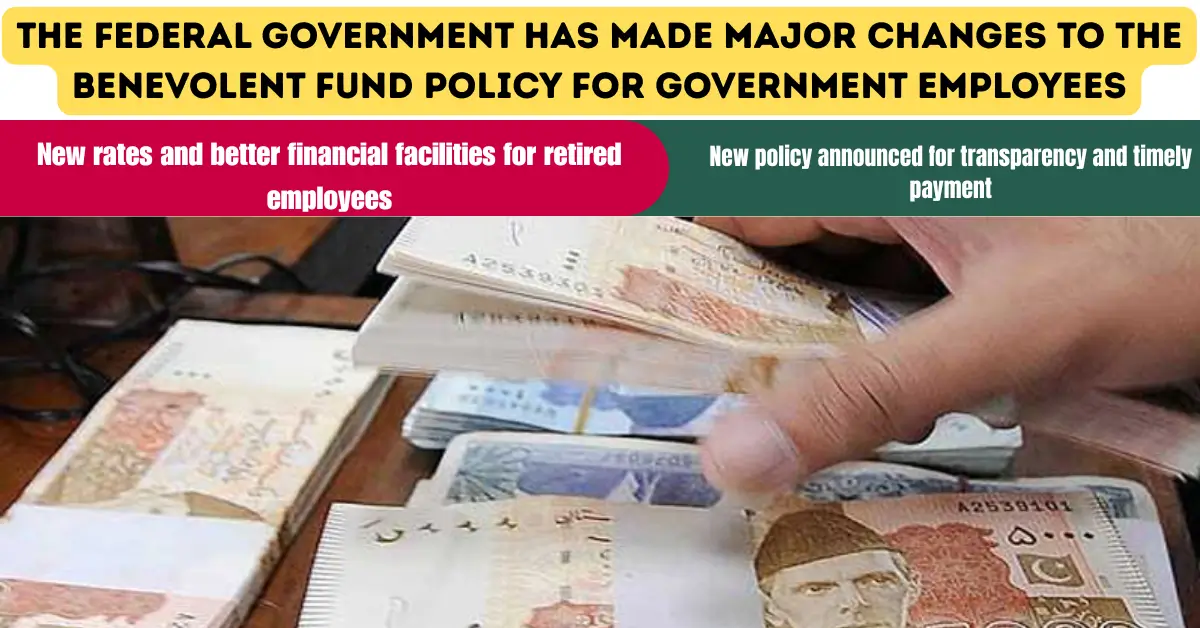Benevolent Fund Policy for Government Employees
In a major policy development, the federal government has decided to revise the Benevolent Fund policy for government employees, aiming to improve financial support for retired civil servants. The decision was discussed during a meeting of the Standing Committee on the Cabinet Secretariat of the National Assembly, chaired by Malik Abrar Ahmed. The new policy outlines increased payments for retired employees based on their job grades and seeks to bring more transparency and structure to the disbursement process.
Key Highlights of the New Benevolent Fund Payment Policy
According to officials present at the meeting, the new Benevolent Fund policy proposes different payment structures based on the employee’s grade at the time of retirement:
- Rs 500,000 will be granted to employees retiring from grades 1 to 10
- Rs 1 million for retirees from grades 11 to 16
- Rs 1.5 million for those retiring from grade 17 and above
This marks a significant change from the previous structure and is aimed at providing more substantial financial relief to government employees after retirement.
KP Govt Rolls Out Interest-Free Loan Programme to Provincial Employees
Financial Impact Assessment Underway
To ensure the new policy is financially sustainable, officials confirmed that a private consulting firm has been hired to conduct a complete financial impact assessment. This firm will review the proposed changes and submit a timeline for implementation.
The Standing Committee has given the Benevolent Fund department 90 days to complete this assessment and present the results, including how the new payments will be funded and rolled out across various government departments.
Concerns Raised During the Meeting
During the committee meeting, PP member Agha Ahsanullah expressed serious concerns about delays in financial benefits for retirees. He criticized the current pace of the process, stating:
“The federal government is waiting for officers to die after retirement.”
His statement highlights the long-standing complaints from retired government employees about delayed or denied benefits. The committee acknowledged these concerns and stressed the need for a timely and fair implementation of the revised Benevolent Fund policy.
Punjab Decision to include Flood Victims in Apni Chhat, Apna Ghar Program
Standing Committee’s Directives
To speed up the process and ensure transparency, the Standing Committee directed the Benevolent Fund officials to:
- Complete the financial assessment within 90 days
- Provide a clear timeline for the implementation of the new policy
- Ensure that all retired employees receive their rightful benefits without unnecessary delays
This move is expected to create accountability and push the relevant authorities to act swiftly.
Additional Meeting Agenda: Relief for Flood Victims
Apart from discussing the Benevolent Fund, the committee also addressed the ongoing issue of flood victim relief. A briefing from the Prime Minister’s Office was requested to provide clarity on the relief efforts.
Committee members also directed the Power Division to explain the method of distributing relief to affected families, ensuring that assistance reaches those in need efficiently and transparently.
Holy Family Hospital to Introduce Kero Ablation Machine (KAB) for Advanced Cancer Treatment
Implications of the New Policy
The revised Benevolent Fund policy, if implemented effectively, can bring several benefits:
- Better financial support for retired government employees
- Greater social security for lower-grade staff who typically retire with limited savings
- Improved morale and motivation among current employees
- Enhanced trust in government institutions for upholding the rights of public servants
However, its success depends heavily on the outcome of the financial assessment and the government’s commitment to timely implementation.

